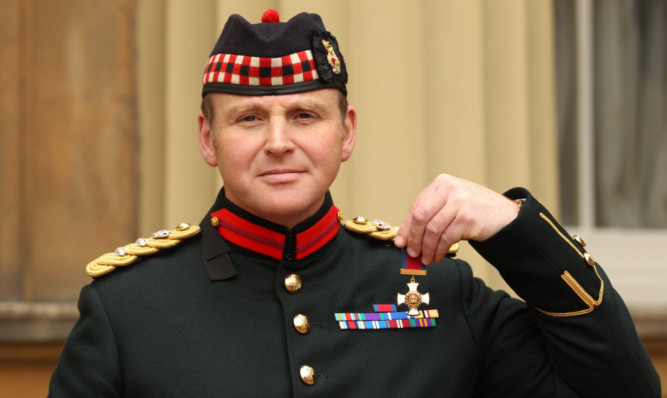The Black Watch officer who led the battalion’s most recent operation in Afghanistan said his award was as much for his brave troops as himself.
Colonel Edward Fenton was presented with a Distinguished Service Order (DSO) at Buckingham Palace on Friday for his “gallant leadership” of 3rd Battalion, Royal Regiment of Scotland (3 Scots) in Helmand Province last winter.
The presentation was made, fittingly, by Prince Charles, the Royal Colonel of The Black Watch Battalion.
Col Fenton, 43, from Carnoustie, said: “It reflects the demands made in Afghanistan of 3 Scots and me getting this is really for the effort the whole battalion made last year.
“The commanding officer gets to wear the medal, but it’s very much for the whole battalion.”
Col Fenton had chatted with Prince Charles and told The Courier it was an extension of previous conversations.
He said: “I met him a number of times throughout the last three-and-a-half years and it was lovely to continue that conversation.
“The Black Watch is very dear to his heart, and having him (give the award) makes it even more special. It’s been a fantastic day and I feel very honoured.”
Col Fenton was accompanied on the day by his wife Max, their seven-year-old son Will and mother Norma.
Based at Warminster, he now oversees staff training across army bases in England and Germany and regularly visits Afghanistan to monitor progress there.
He said: “It’s great to be still involved in everything because I miss the battalion and field soldiering dreadfully, but I still get to work with soldiers and get teams ready to deploy.”
A former Dundee High School pupil, Col Fenton commanded the largest combined force in the notorious Helmand Province during Operation HERRICK 15 from October 2011.
For six months he was in charge of 1,500 troops operating in the country’s Nad-e-Ali district, working with Afghan leaders to hasten the transition to their taking control.
Their actions meant the citizenry could return to their normal lives without fear of reprisal from the Taliban fighters at the centre of the conflict.
The battalion were involved in a series of conflicts as they sought to clear insurgents from the zone in which they were working.
Col Fenton often led from the front and was exposed to direct fire and threats from improvised explosive devices.
Despite the escalating violence in the region, Col Fenton’s command returned to the UK with no men lost.
